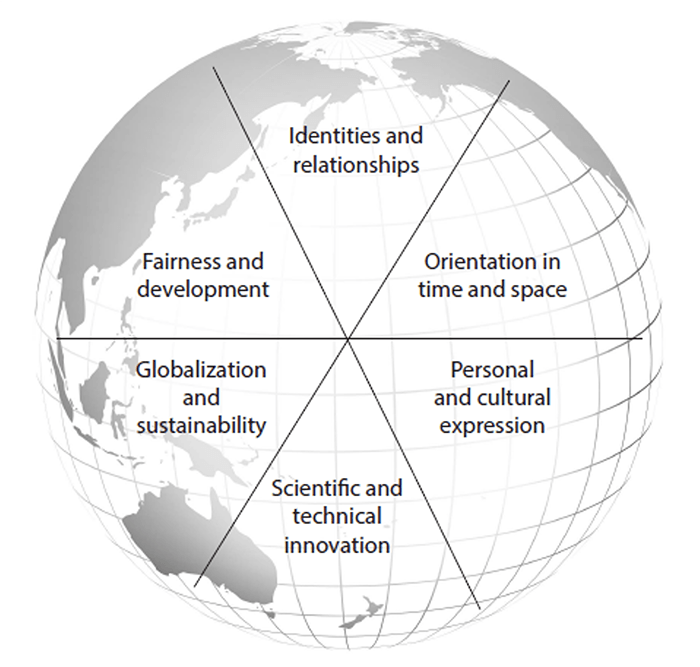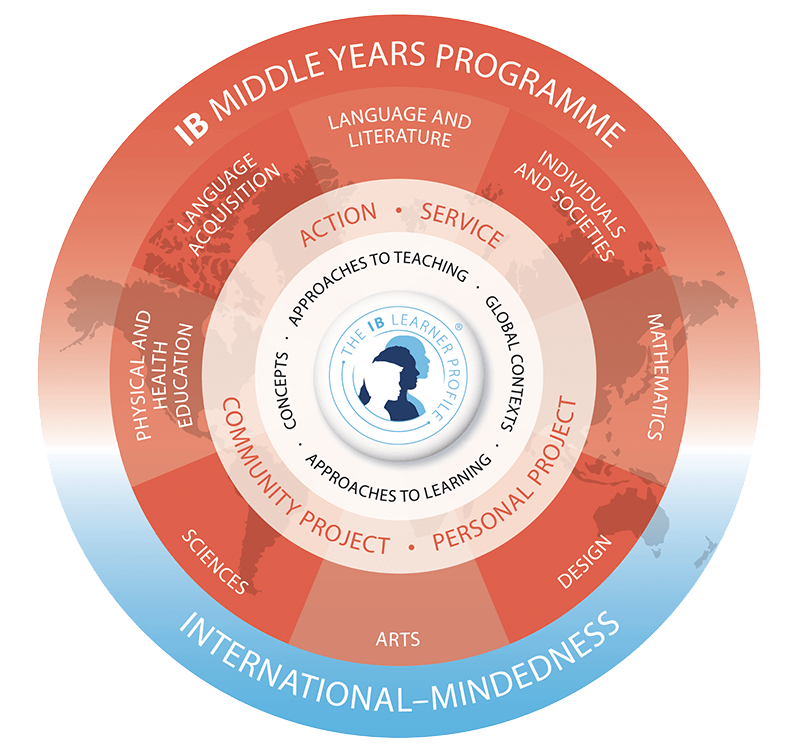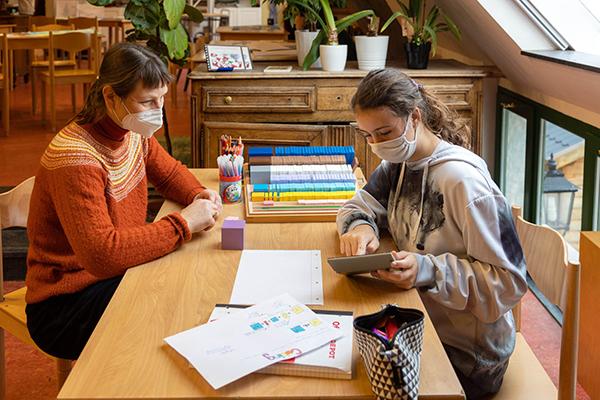
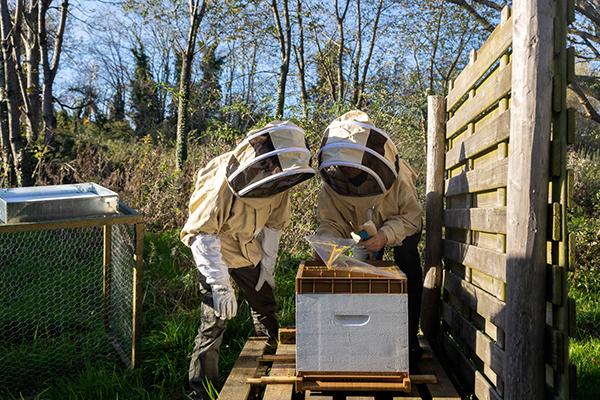
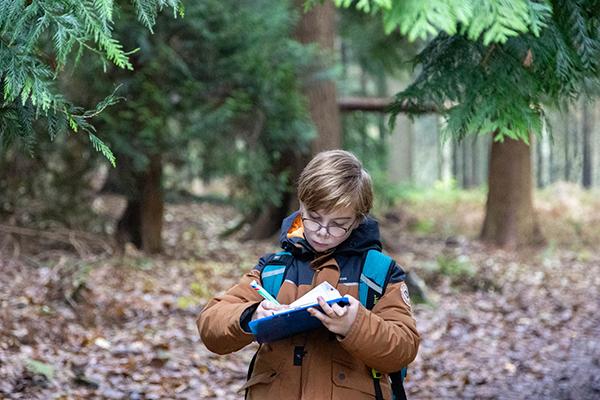
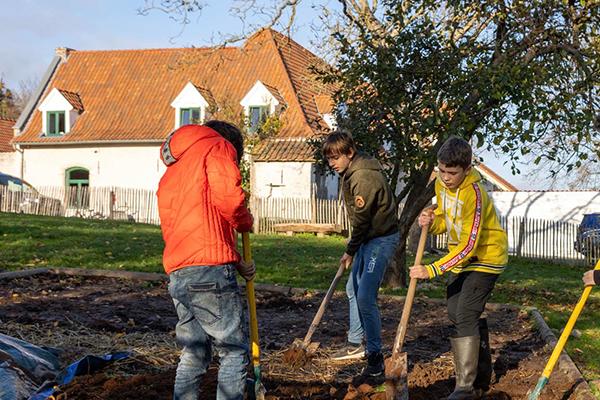
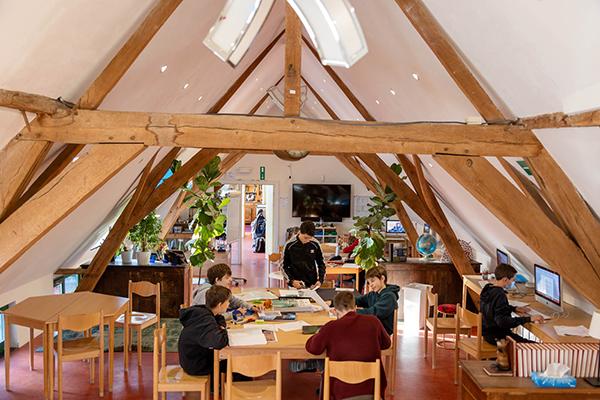
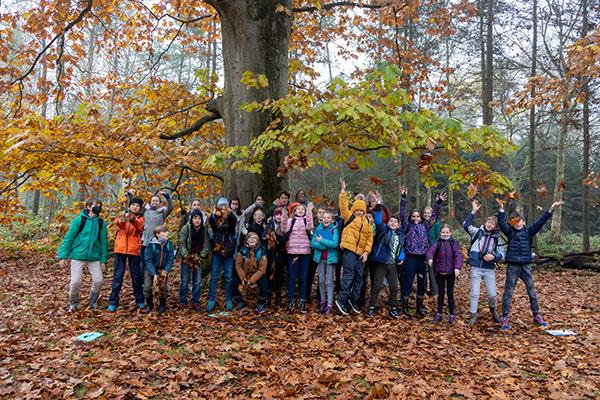
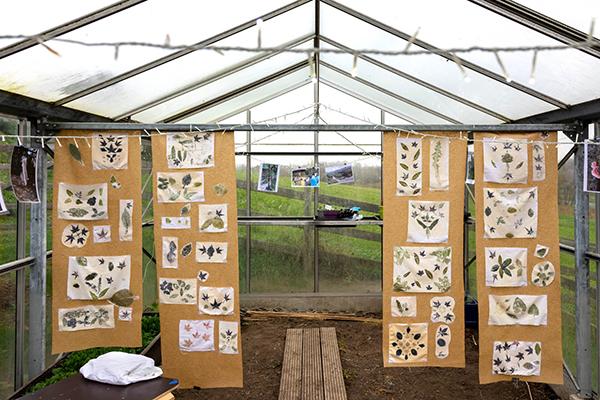
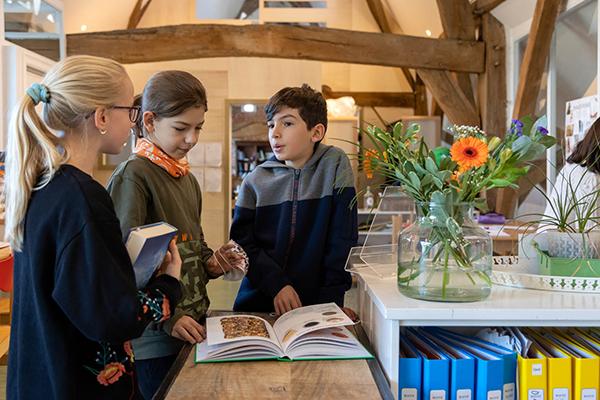
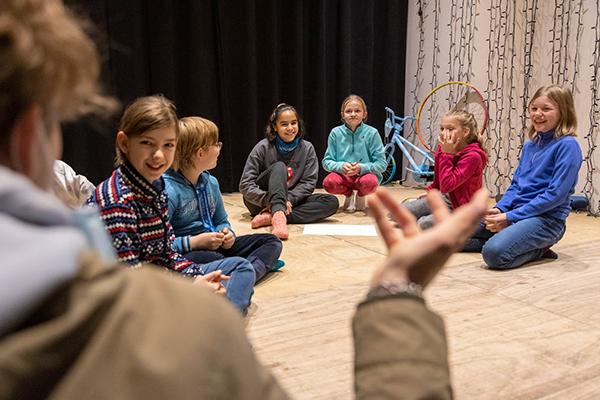
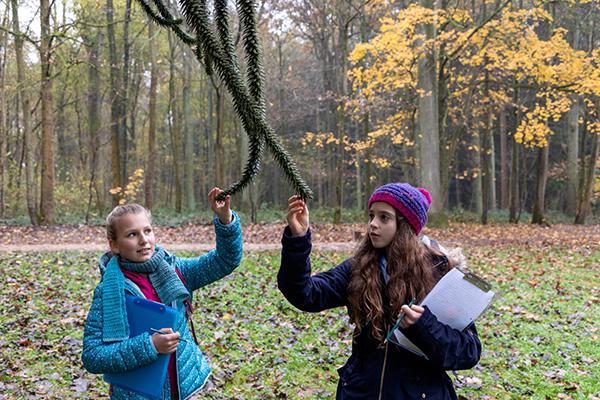
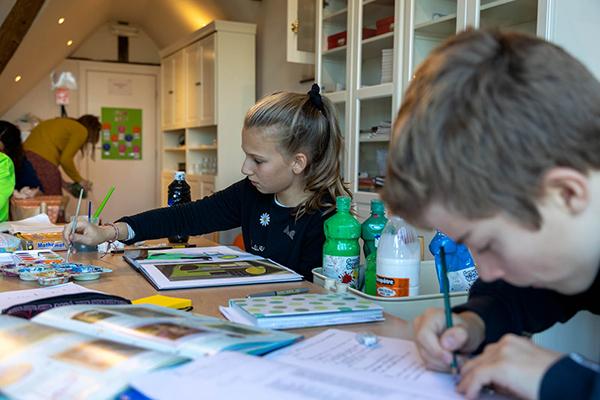
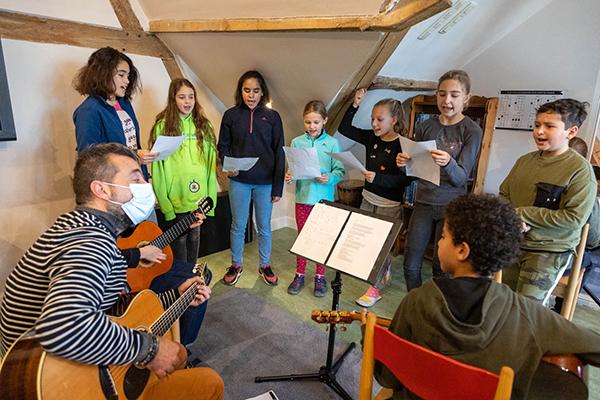
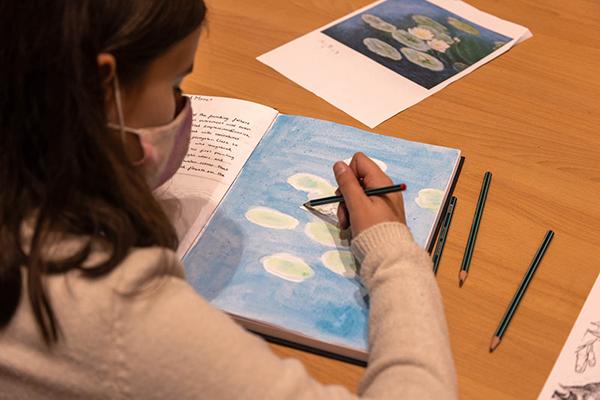
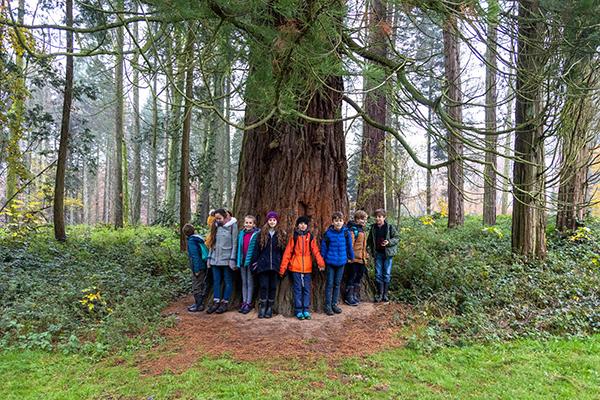
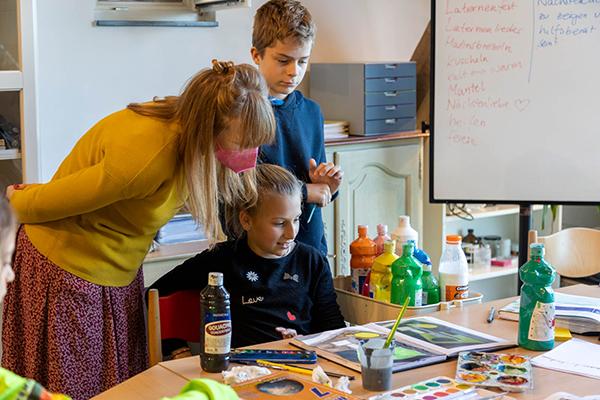

Authorised IB World School
On this page: International Baccalaureate Middle Years Programme (IB-MYP)
Would you like to read more about IB Diploma Programme?
The International Montessori School is an authorised International Baccalaureate World School!
Our school offers the highly respected and internationally acknowledged
IB Middle Years Programme and Diploma Programme.
Montessori education is very compatible to this world wide recognised form of secondary education. Students entering our school at a young age are in the fortunate position to complete both their primary and secondary education in an ongoing individualised and international fashion. Students are exposed to the full curriculum by specialised teachers. They work in small group settings and have a reciprocal relationship with the teachers. Classes stop at 15.30. This is followed three days a week with 45 minutes of guided homework, during which mentors are available to help the students.
The International Montessori was the first school in Belgium to offer the IB MYP programme. Students are fully prepared to continue and finalise the two-year pre-university course which is also available at the school, being the Diploma Programme. Upon successful completion the students receive an International Baccalaureate Diploma.
International Montessori has graduates in universities around the world studying for degrees spanning all areas of study, from fine arts and agriculture to engineering and medicine.
Being a World School really means helping in the development of world citizens.
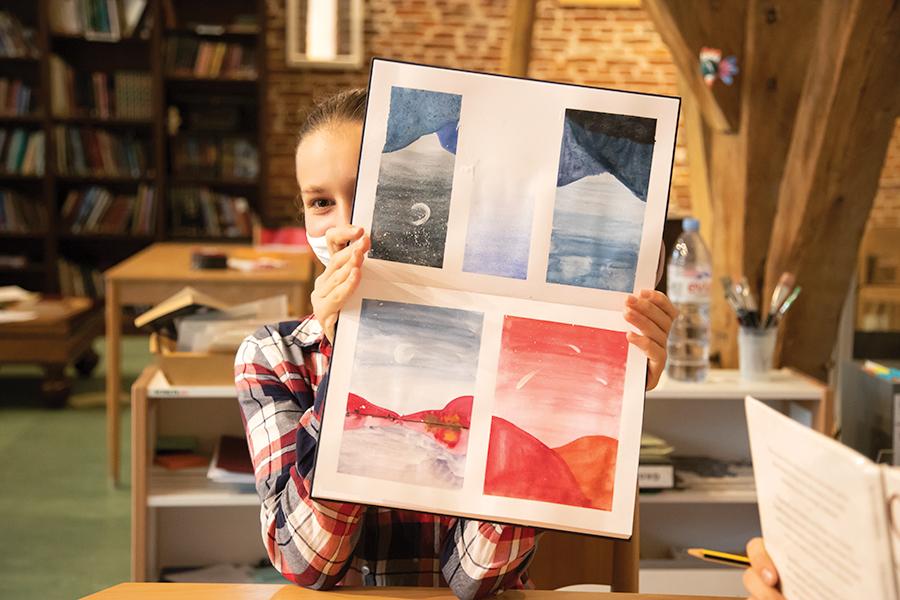
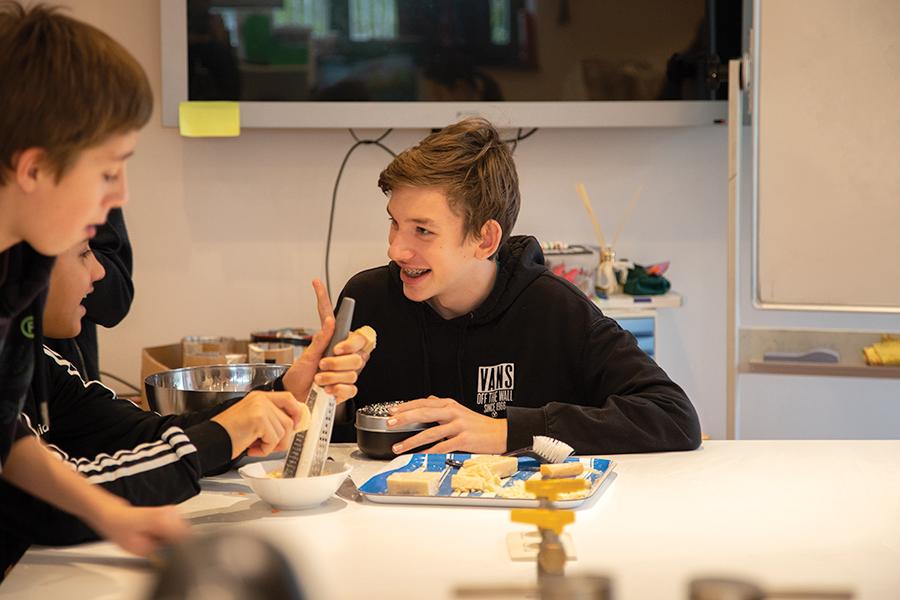
Teenagers aged 11 to 16 years old
IB Middle Years Programme (IB-MYP)
This stage of development can be compared to the first one: dynamic, unsettling, and intense. Everything that was stable and understood before now starts to shake. Basically another self-construction is taking place, physically as well as mentally. For the first time in their life, teenagers are able to reflect upon their own thinking and start to philosophy. They can think about their own thinking, which leads to confusion. So much so that research has shown that the mental capacities actually are reduced during this part of life.
Bringing two relatively small groups of teenagers, MYP 1&2 and MYP 3, 4 & 5, covering the first five years of adolescence together with adults who live with them and guide them through this period in life, is the ideal way to young adulthood. They have a drive to become part of the society at large, but at the same question, criticize and hesitate to participate. Different sections of their society are introduced in the form of a range of experienced professionals, presenting all the necessary subjects. In this way all ingredients are present for the next confident step forwards.
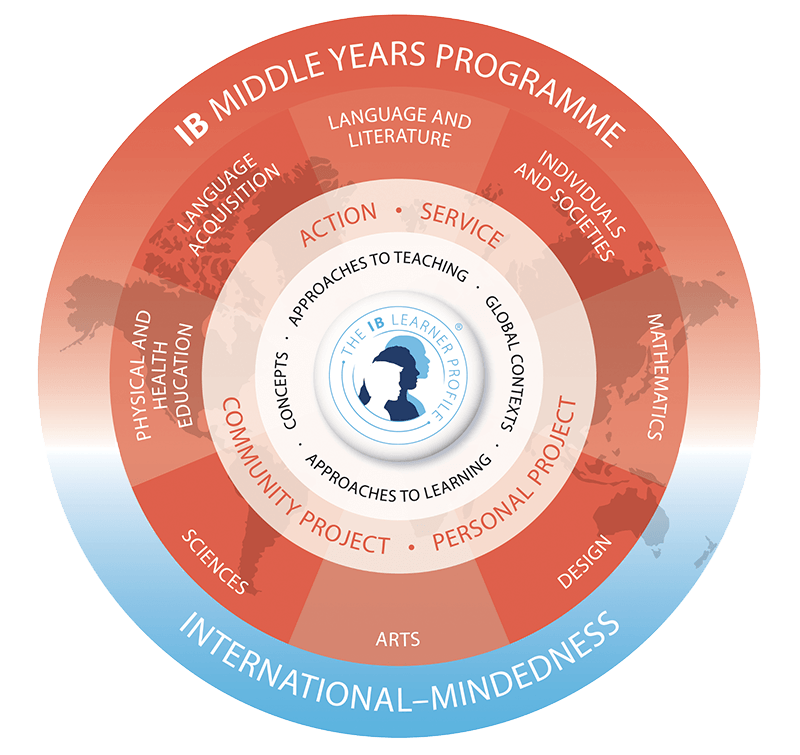
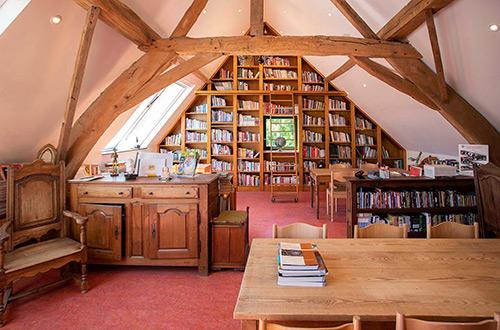
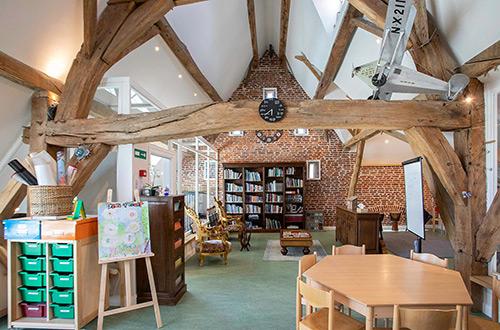
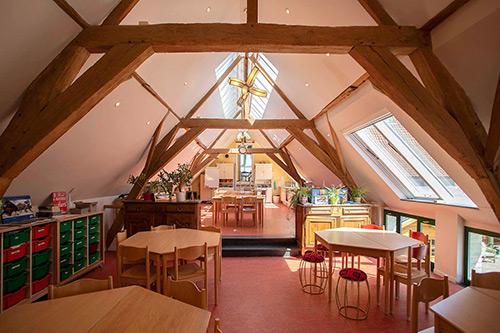
Middle Years Programme Group 1 & 2
Like with all the previous groups, Children’s Houses and primary children, also at this stage in their life the young adolescents are given the opportunity to spend their days at school with a mix of age ranges. Children of 11 to 13 are grouped together. Taken care off by teachers who remain with them all day long, five days per week, they can confidently grow, change once again and mature. They leave the period of childhood behind and gradually are introduced to and come to terms with a previously unknown territory; the first steps on the path to adulthood.
The two adults who live, teach, explain, put into new perspectives and always are there and help to resolve new obstacles are joined on a day to day basis by various experienced professionals. Together they cover all the subjects. Being a small multi-age group, differentiation is the point of departure. The learning environments consist not only of their beautiful classrooms, but also the multi-functional room (art, theatre, music), the land component with ponies (Colin and Pipo), a horse (Verona), chickens, fields and gardens, sport grounds and the very cosy and comforting courtyard are all used to their fullest potential.
The children find themselves in a rather unique situation, where they are able to progress without external competition. Assessments, mainly formative, but also some summative, take place on a regular basis providing ample feedback. Together with presentations, both verbal and written, on-going small and larger assignments, and regular work ensure these few transit years between childhood and young adulthood become and remain a smooth and constructive period in their life.
Middle Years Programme Group 3
By the time the children have reached the age of thirteen, they find themselves well and truly in the Third Plane of Development (12 to 18 years old). The majority of the previous known and understood securities and certainties become something of the past. Things and thoughts someone could rely on the best part of your life, are now questioned by your very own thoughts. And the possible thoughts of the others, being either family, teachers, peers, or friends, start to make someone rather insecure and unsure. Opinions, perspectives and points of view need to be defined and redefined. Someone cannot even rely on her or his own body. This is hard work.
Like in previous stages in life, again a lot of support can be found amongst a mixed-age range group. The young adolescents, who spend their day-to-day time together, find themselves in a non-threatening and supportive setting. The perspectives and experiences of a sixteen year old can be very comforting to a ‘younger sibling’ of thirteen. Concerns, worries and unanswered questions might become just a little more clear. The permanent present adults guide, steer, stop and start this ongoing process.
Also here are always two adults with the teenagers, taking care of a variety of subjects and study topics whilst supported by a group of solid and grounded colleagues. Together they ensure that a multitude of ever-progressing topics, study and work areas are introduced, investigated, extended, studied, completed and consolidated. The integration of mind and body by means of the constructive use of the hands is central to the various stages of the curriculum. Always can the developmental needs be found at the forefront. Therefore physical and mental activities are ever present, inside as well as outside.
By means of doing, talking, working, reflecting, making, creating and maintaining friendships, and lots and lots more, the young adults in the making find themselves by the age of sixteen well prepared for yet another stage in their life; the final two years of High School. Academically solid and strong, emotionally stable and confident, and physically balanced and well-adjusted, the future adult is ready for the work needed to acquire this important certificate, a real DP Diploma.
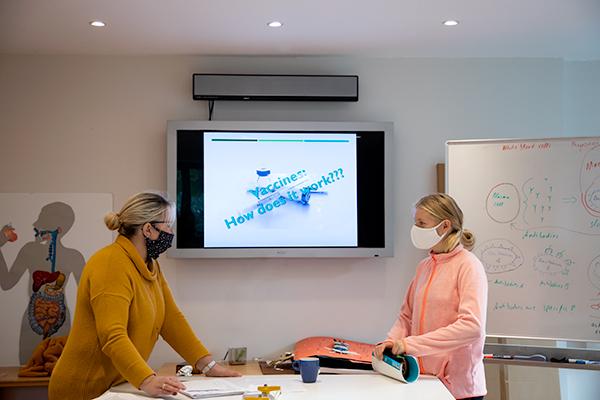
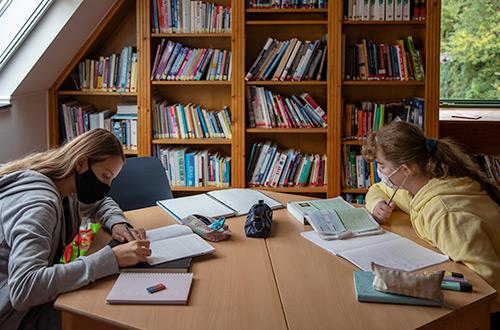
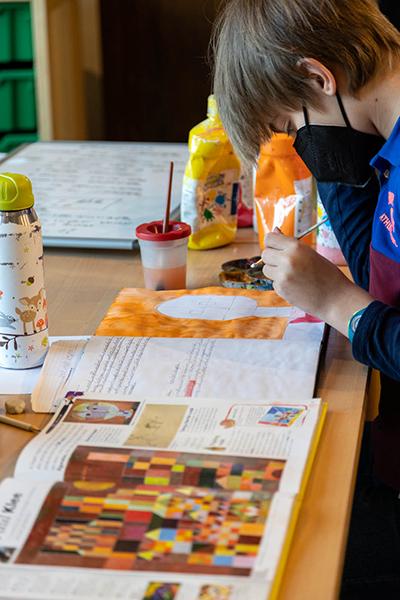
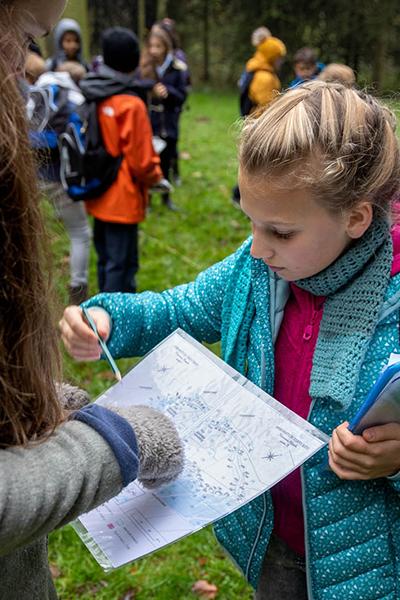
Middle Years Programme | Subjects
Mathematics
The MYP mathematics program has four objectives. Knowing and Understanding, Investigating patterns, Communicating and Applying mathematics in real-life contexts are the headings that are used throughout the five years. Knowing and Understanding has the objective that requires students to demonstrate knowledge and understanding of the concepts and skills in the areas of number, algebra, geometry and trigonometry, and statistics and probability. Investigating patterns allows the students to experience the excitement and satisfaction of mathematical discovery. Communicating in mathematics provides a powerful and universal language. Students are expected to use appropriate mathematical language and different forms of representation. Applying mathematics in real-life contexts encourages students to see mathematics as a tool for solving problems in an authentic real-life context.
Key concepts discovered are form, logic, and relationships. Related concepts studied are change, justification, patterns, simplification, equivalence, measurement, quantity, space, generalization, models, representation and systems. Global contexts explored are identities and relationships, orientation in space and time, personal and cultural expression, scientific and technical innovation, globalization and sustainability and, fairness and development. Thinking, social, communication, self-management and research skills are all developed.
Mathematics is a subject that is alive with the thrill of exploration and the rewards of discovery. MYP mathematics promotes both inquiry and application, helping students to develop problem-solving techniques that transcend the discipline and that are useful in the world outside school.
Language and Literature - Mother tongue
Students study their mother tongue or language they know best whilst being abroad at a thorough level. The chosen language can be English or French. Students read, analyse and compare various texts from informal to formal sources. These range from magazines, newspapers, essays, and literature. They study grammar, visual communication in films, advertisement, and various periodicals. They learn how to write texts creatively in a variety of styles and learn to perform critical comparisons and synthesis of information. On an oral level, they deliver presentations and speeches with the use of various tools including electronic media.
Language acquisition - Second languages
Speaking second languages is a tool in discovering other cultures, learning about other people and thereby developing respect and enjoyment of diversity. Beside the study of English and French language, Dutch, German and Spanish are on offer as second languages. These are taught in a dynamic and varied way, and are integrated in real life contexts. Students take at least one second language, and depending on their background can take additional languages. At the foundation level, the students learn to communicate orally and how to write in everyday situations. At the standard level they are exposed to extended speech in books, articles, news and films and expand vocabulary within non-familiar areas. The spoken language becomes fluent and they use all tenses. They become able to express their ideas and opinions.
At the advanced level, students can understand extended speech and texts, both factual and literary. They can express themselves fluently, using a broad vocabulary. And they are able to write clear, well-structured texts using an adapted style and vocabulary. They are able to translate a complex message into their own words and present it, adding their own points of view.
Sciences: Physics, Chemistry and Biology
The adolescent wants to contribute. Through participation in real work they create a sense of belonging and they add value to society. The theory demanded in order to do their work is brought to life in the different subjects, also in the sciences being biology, chemistry and physics.
Science is a discipline in which students are exposed to scientific knowledge and learn to apply it in order to construct scientific explanations of phenomena found around them. Experimental work and investigation are used to develop the logical and critical mind. There is emphasis on the awareness of the ethical, social, economic, political, cultural and environmental implications of the practice and use of science and technology as seen today in society.
Individuals and Societies
Current society becomes a point of departure. Interdisciplinary project work includes human history, geography, philosophy and social sciences. The subjects are integrated thus forming a meaningful whole. Students practice critical and logical thinking based on important academic knowledge. Literature, essays, research documents, presentations and exposition of work are some forms of the visual outcome of the internal processes.
Adolescence love to connect and reflect; they can now think about their own thinking! Amongst other books, Jostein Gaarder`s “Sophie`s World” is one of the student’s favourite.
Arts: Music, Visual Art and Theatre
The students discover themselves and build up concentration and self-confidence through the use of different forms of art.
Adolescents need time and place to be expressive and creative. The environment includes dance, music, drama, art, craft, drawing, poetry and creative writing. Modes of self-expression are exhibited through oral presentations, meetings, visual displays, video recording, theatre productions, journaling and interviewing others.
Art classes help develop students artistic creativity as well as an awareness of their talents. Visual art lessons give the students an opportunity to learn about history of art as well as developing practical skills to express themselves and their ideas. They explore through a variety of themes and learn to interpret in an artistic manner.
All students play a musical instrument and can choose between violin, piano and guitar. Music specialists give individual or small groups lessons on a weekly basis. Students also form bands and choirs depending on and related to their drama performances and music initiatives.
Design: Computer sciences and Product Design
The computer and its applications are discovered through IT lessons and autonomous work. IT is used amongst other things for Internet research, creation of newsletters, presentations, photo work and graphs. The curriculum includes:
- Online safety and recommended best practices
- Understanding of commonly used terms in computing
- File management, both locally and across networks
- Use of spreadsheets to understand data manipulation and data control
- Use of presentation software for communication of projects and personal studies.
Opportunities are created in becoming active participants in society and live responsibly in a changing and increasing interrelated world. Many of these projects fall under the heading ‘Product Design.’ Projects change over the years, thus offering a variety of experiences. The objective is to encourage and enable students to:
Develop an appreciation for the significance of technology in life, society and the environment
Use knowledge, skills and techniques to create quality products, processes and solutions
Develop respect for other’s viewpoints and appreciate alternative solutions to problems
Reinforcing and integrating skills learned in other disciplines
Develop thinking skills involving problem-solving, creativity, and critique through the application of the design cycle.
The Design Cycle:
In order to help students think analytically, to solve problems and to succeed in the creation of ideas and solutions, they are encouraged to use the design cycle.
The steps are outlined below:
- Inquiring and Analysing: identify the product or process that needs to be created or problem to be solved. This includes researching, interpreting, handling of data, and evaluating the importance of the problem for life, society, and the environment
- Developing Ideas: List the specific design requirements that must be met by the product/solution. Create several feasible designs that meet the specifications for the required result
- Creating the Solution: Construct a plan to create the idea that has a series of logical steps and that makes effective use of resources and time. Follow the plan and create, keeping in mind that appropriate quality is needed
- Evaluating: Evaluate the end result. This includes testing of the product/solution, reflection of the overall process and at every step of the design process, and suggestions for improving the fit, quality, and process of the created product/solution.
Design is not only valuable in reinforcing and integrating skills learned in other disciplines, it also fosters awareness of the social and ethical implications of technological development. This process is rarely a simple linear progression. It usually involves critical analysis and moving back and forth between the steps. Ultimately, it stimulates the students’ ingenuity and encourages them to combine intellectual talents and practical skills.
Physical and Health Education
Sports, gymnastics, circus activities and games allow for individual motor development, skill coordination and team participation. The most important aims are to encourage the development of “intelligent performers” and to stimulate students in understanding the importance of a balanced, healthy lifestyle. A sports committee, made up of MYP students and their sports teacher, plans special sports events, organises sport hall facilities, fields, equipment, transport and parent communication.
The objectives of teaching and learning physical and health education are:
- To encourage and enable students to work to their optimal level of physical fitness
- To become aware of movement as a creative medium connected to communication and expression
- To develop the motor skills necessary to participate successfully in a variety of physical activities
- To experience enjoyment and satisfaction through physical activity
- To develop social skills that demonstrate the importance of teamwork and cooperation in group activities
- To learn to reflect upon physical activity in both a local and intercultural context.
Learner Profile
The aim of all IB programmes is to develop internationally minded people who, recognising their common humanity and shared guardianship of the planet, help to create a better and more peaceful world. We believe that these attributes can help individuals and groups to become responsible members of local, national and global communities.
The required and acquired skills are called the Learner Profile. During the IB programmes students learn to strive to become:
Inquirers
We nurture our curiosity, developing skills for inquiry and research. We know how to learn independently and with others. We learn with enthusiasm and sustain our love of learning throughout life.
Knowledgeable
We develop and use conceptual understanding, exploring knowledge across a range of disciplines. We engage with issues and ideas that have local and global significance.
Thinkers
We use critical and creative thinking skills to analyse and take responsible action on complex problems. We exercise initiative in making reasoned, ethical decisions.
Communicators
We express ourselves con¬fidently and creatively in more than one language and in many ways. We collaborate e ffectively, listening carefully to the perspectives of other individuals and groups.
Principled
We act with integrity and honesty, with a strong sense of fairness and justice, and with respect for the dignity and rights of people everywhere. We take responsibility for our actions and their consequences.
Open-minded
We critically appreciate our own cultures and personal histories, as well as the values and traditions of others. We seek and evaluate a range of points of view, and we are willing to grow from the experience.
Caring
We show empathy, compassion and respect. We have a commitment to service, and we act to make a positive diff erence in the lives of others and in the world around us.
Risk-takers
We approach uncertainty with forethought and determination; we work independently and cooperatively to explore new ideas and innovative strategies. We are resourceful and resilient in the face of challenges and change.
Balanced
We understand the importance of balancing di fferent aspects of our lives—intellectual, physical, and emotional—to achieve well-being for ourselves and others. We recognize our interdependence with other people and with the world in which we live.
Reflective
We thoughtfully consider the world and our own ideas and experience. We work to understand our strengths and weaknesses in order to support our learning and personal development.


